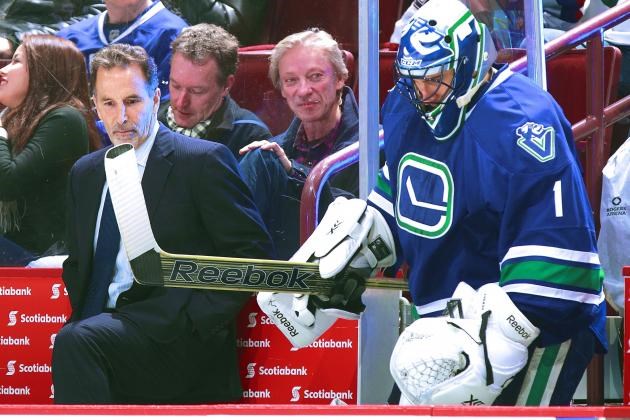Roberto Luongo has announced his retirement and it’s going to cost the Canucks.
The cap recapture penalty clause in the CBA, affectionately nicknamed “The Luongo Rule,” will now come into effect, hitting the Canucks with an approximately $3 million cap hit for the next three years.
This might seem confusing to some — why are the Canucks getting a cap hit for a player retiring that isn’t even on their roster? It’s a fair question, because the rule itself is about as vindictive, petty, and unfair a rule as we’ve ever seen in the NHL.
The Canucks under Mike Gillis and Laurence Gilman took advantage of the structure of the NHL’s Collective Bargaining Agreement to re-sign Roberto Luongo to a long-term contract without restricting their ability to ice a Cup-contending lineup. To whit, they signed him to a 12-year deal that was heavily frontloaded: it paid Luongo $10 million in the first year of the deal, then declined sharply from there, ending with a salary of just $1 million in each of the final two years of the contract.
That structure allowed the Canucks to keep Luongo’s actual cap hit at ~$5.33 million, which was ludicrously low for a top-tier goaltender like Luongo. That, combined with Gilman’s cap wizardry, gave the Canucks a far more expensive lineup in their run to the 2011 Stanley Cup Final. It also infuriated the NHL’s head honchos.
Instead of just adding language into the CBA that prevented teams from signing similar contracts, the NHL instituted a new rule that retroactively penalized teams that benefited from contracts like Luongo’s. Backdiving deals like Luongo’s would be hit with a salary cap penalty equivalent to the amount they benefited from the lower cap hit.
Luongo has three years remaining on his contract. By the NHL’s calculations, the Canucks received a benefit of approximately $9 million while Luongo was with them. That ~$9 million is spread out over the remaining three years, hitting the Canucks with ~$3 million in a salary cap penalty in each year.
That’s not ideal, particularly as the Canucks attempt to move from rebuilding to contending. That’s $3 million that isn’t available to sign free agents or take on a bigger contract in a trade.
The actual difference in cap hit is actually closer to $2.2 million, as the Canucks still had $800,000 in retained salary from Luongo’s contract. That $800,000 is now off the books.
Correction: with Luongo's $3,033,206 cap recapture penalty taken into account and his $800k in retained salary removed, we now show the #Canucks with a projected cap hit of $66.0M and projected cap space of $15.5M with a roster of 22 (13F 7D 2G)https://t.co/8ihMfbF7H7 pic.twitter.com/i3sPpbdTOM
— CapFriendly (@CapFriendly) June 26, 2019
Luongo’s isn’t the first contract that has been hit with the cap recapture penalty — the New Jersey Devils have a cap recapture penalty of $250,000 per year through 2025 from Ilya Kovalchuk, even though Kovalchuk unretired and returned to the NHL. Luongo’s is certainly more punitive, however, as $250,000 per year does little to restrict the Devils.
Most other players that would have been eligible for a cap recapture penalty conveniently went on long-term injured reserve for the final years of their contracts, avoiding the penalty. If you read Roberto Luongo’s open letter to his fans, it certainly seems like that could have been an option for him.
“Since I had my hip surgery a couple of years ago, I've been showing up two hours before every practice and three hours before every game to work out my hip,” said Luongo in his letter. “Even at night, whether it was the night before a game or even a night off, there I was rolling out, doing strengthening exercises. My entire life revolved around recovery, strengthening and making sure I was ready to go the next day.”
That’s not Luongo’s style, however, and he certainly deserves to retire on his own terms. The Canucks salary cap definitely shouldn’t enter into the equation.
This is far from the worst-case scenario for the Canucks. That would have come if Luongo stuck it out for a couple more years and retired in 2021. In that scenario, the Canucks could have been dinged with a cap penalty of around $8.5 million.
Still, Luongo’s cap recapture penalty will still be on the books when Elias Pettersson, Quinn Hughes, and Thatcher Demko need new contracts. Depending on how this year’s free agency goes and the new contract for Brock Boeser, that could cause some problems.



